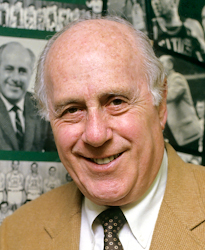 Auerbach in front of collage created by his brother, Zang Auerbach | |
| Personal information | |
|---|---|
| Born | September 20, 1917 Brooklyn, New York, U.S. |
| Died | October 28, 2006 (aged 89) Washington, D.C., U.S. |
| Listed height | 5 ft 10 in (1.78 m) |
| Listed weight | 170 lb (77 kg) |
| Career information | |
| High school | Eastern District (Brooklyn, New York) |
| College |
|
| Position | Guard |
| Coaching career | 1940–1966 |
| Career history | |
| As coach: | |
| 1940 | St. Albans School |
| 1940–1943 | Roosevelt HS |
| 1946–1949 | Washington Capitols |
| 1949 | Duke |
| 1949–1950 | Tri-Cities Blackhawks |
| 1950–1966 | Boston Celtics |
| Career highlights and awards | |
As head coach:
As executive:
| |
| Career coaching record | |
| NBA | 938–479 (.662) |
| Record at Basketball Reference | |
| Basketball Hall of Fame | |
Arnold Jacob "Red" Auerbach (September 20, 1917 – October 28, 2006) was an American professional basketball coach and executive. He served as a head coach in the National Basketball Association (NBA), most notably with the Boston Celtics. Auerbach was also the head coach of the Washington Capitols and Tri-Cities Blackhawks. As a coach, Auerbach set NBA records with 938 wins and nine championships.[a][1] After his coaching retirement in 1966, he served as president and front office executive of the Celtics until his death. As general manager and team president of the Celtics, he won an additional seven NBA titles for a total of 16 in a span of 29 years, the most of any individual in NBA history, making him one of the most successful team officials in the history of North American professional sports.[2]
Auerbach is remembered for being a pioneer of modern basketball, redefining basketball as a game dominated by team play and defense and introducing the fast break as a potent offensive weapon.[2] He coached many players who went on to be inducted into the Basketball Hall of Fame.
Auerbach was vital in breaking down color barriers in the NBA. He made history by drafting the first African-American NBA player, Chuck Cooper in 1950, introducing the first African-American starting five in 1964,[3] and hiring Bill Russell as the first African-American head coach in North American sports in 1966.[4] Famous for his polarizing nature, he was also well known for smoking a cigar when he thought a victory was assured, a habit that became, for many, "the ultimate symbol of victory" during his Boston tenure.[2]
In 1967, the NBA Coach of the Year award, which he had won in 1965, was named the "Red Auerbach Trophy", and Auerbach was inducted into the Basketball Hall of Fame in 1969.[1] In 1970, Auerbach was named President of the Boston Celtics, and first held the presidency from 1970 to 1997. In 2001, after having spent four years as the team's vice-chairman, he returned to the role of team president and served in that capacity until his death in 2006.[5] In 1980, he was named the greatest coach in the history of the NBA by the Professional Basketball Writers Association of America,[6] and was NBA Executive of the Year in 1980.[1] In addition, Auerbach was voted one of the NBA 10 Greatest Coaches in history, inducted into the National Jewish Sports Hall of Fame, and honored with a retired number 2 jersey in the TD Garden, the home of the Boston Celtics.
Cite error: There are <ref group=lower-alpha> tags or {{efn}} templates on this page, but the references will not show without a {{reflist|group=lower-alpha}} template or {{notelist}} template (see the help page).
- ^ a b c May, Peter (October 29, 2006). "Auerbach, pride of the Celtics, dies". Boston.com. Retrieved July 10, 2007.
- ^ a b c "Red Auerbach biography". JockBio.com. Archived from the original on February 10, 2012. Retrieved July 10, 2007.
- ^ Ryan, Bob (October 30, 2006). "Red was just full of color". Boston.com. Retrieved July 10, 2007.
- ^ "NBA Legend Bill Russell Became First Black Coach in Pro Sports 46 Years Ago Today". April 18, 2012.
- ^ "Boston Celtics Management and Captains". NBA.com. Retrieved October 8, 2020.
- ^ Goldstein, Richard (October 29, 2006). "Red Auerbach, Who Built Basketball Dynasty, Dies at 89". The New York Times. Retrieved July 10, 2007.